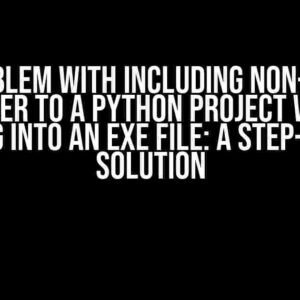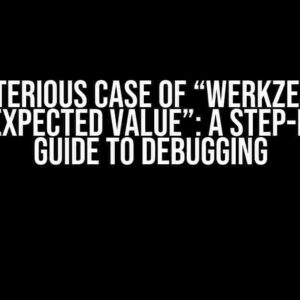In the world of Python packaging, Poetry has become a popular choice for managing dependencies and building projects. One of the lesser-known features of Poetry is the ability to install packages without certain dependencies, using the `–without` group flag. In this article, we’ll dive deep into what this flag does, how it works, and provide step-by-step instructions on how to use it to optimize your project’s dependencies.
What is the `–without` Group Flag?
The `–without` group flag is a powerful feature in Poetry that allows you to exclude specific dependencies from being installed when running the `poetry install` command. This flag is particularly useful when you have dependencies that are only required for development or testing, and you want to exclude them from your production environment.
Why Use the `–without` Group Flag?
There are several reasons why you might want to use the `–without` group flag:
- Reduced dependencies: By excluding unnecessary dependencies, you can reduce the overall size of your project’s dependency graph, making it more efficient and easier to manage.
- Improved performance: Dependencies can slow down your project’s performance, especially if they’re not necessary for production. By excluding them, you can improve your project’s speed and responsiveness.
- Better security: Excluding dependencies that are only required for development or testing can improve the security of your production environment, as you’re reducing the potential attack surface.
- Customized environments: The `–without` group flag allows you to create customized environments for different use cases, such as development, testing, and production.
How to Use the `–without` Group Flag
To use the `–without` group flag, you’ll need to add it to your `poetry install` command, followed by the name of the group you want to exclude. The basic syntax is:
poetry install --without For example, if you want to exclude the `dev` group, you would run:
poetry install --without devThis command will install all dependencies except those listed in the `dev` group.
Creating a Custom Group
To use the `–without` group flag, you’ll need to define a custom group in your `pyproject.toml` file. Here’s an example:
[tool.poetry]
name = "myproject"
version = "1.0.0"
[tool.poetry.dependencies]
python = "^3.9"
[tool.poetry.group.dev]
jupyter = "^1.0.0"
pytest = "^6.2.0"
In this example, we’ve defined a custom group called `dev`, which includes the `jupyter` and `pytest` dependencies. To exclude these dependencies when running `poetry install`, you would use the following command:
poetry install --without devAdvanced Usage
The `–without` group flag can also be used in combination with other Poetry commands, such as `poetry update` and `poetry lock`. Here are some examples:
`poetry update`
To update your dependencies while excluding a specific group, you can use:
poetry update --without For example:
poetry update --without dev`poetry lock`
To generate a `poetry.lock` file that excludes a specific group, you can use:
poetry lock --without For example:
poetry lock --without devCommon Use Cases
The `–without` group flag is particularly useful in the following scenarios:
Development Environments
In development environments, you may have dependencies that are only required for development, such as testing libraries or IDE integrations. By excluding these dependencies using the `–without` group flag, you can create a leaner production environment.
Testing Environments
In testing environments, you may have dependencies that are only required for testing, such as testing frameworks or mocking libraries. By excluding these dependencies using the `–without` group flag, you can create a more efficient testing environment.
CI/CD Pipelines
In CI/CD pipelines, you may want to exclude certain dependencies that are only required for development or testing. By using the `–without` group flag, you can create a more efficient pipeline that only installs the dependencies required for production.
Conclusion
The `–without` group flag is a powerful feature in Poetry that allows you to customize your project’s dependencies and optimize your production environment. By following the instructions in this article, you can start using the `–without` group flag to reduce your project’s dependencies, improve performance, and enhance security.
FAQs
Here are some frequently asked questions about the `–without` group flag:
| Question | Answer |
|---|---|
| Can I use multiple groups with the `–without` flag? | Yes, you can use multiple groups by separating them with commas. For example: `poetry install –without dev,test` |
| Can I use the `–without` flag with other Poetry commands? | Yes, the `–without` flag can be used with other Poetry commands, such as `poetry update` and `poetry lock`. |
| Will the `–without` flag affect my project’s dependencies? | The `–without` flag will exclude the specified dependencies from being installed, but it will not affect the dependencies that are required by your project. |
By mastering the `–without` group flag, you can take your Poetry skills to the next level and create more efficient, optimized projects. Happy coding!
Frequently Asked Question
When it comes to poetry, understanding the nuances of installation can make all the difference. Dive into the world of poetry and explore the unknown with these frequently asked questions about “Poetry installs `–without` group”.
What does “Poetry installs `–without` group” mean, and how does it affect my project?
When you install poetry with the `–without` group flag, it means you’re excluding a specific group of dependencies from being installed. This can be useful when you want to omit certain features or packages that aren’t essential for your project. By doing so, you’re streamlining your installation and reducing the overall package size.
Why would I want to exclude certain dependencies from my poetry installation?
There are several reasons to exclude dependencies. For instance, you might have conflicting package versions, or you might not need specific features for your project. By excluding unnecessary dependencies, you can avoid potential issues, reduce installation time, and optimize your project’s performance.
How do I specify which group of dependencies to exclude during poetry installation?
To exclude a specific group of dependencies, you can use the `–without` flag followed by the group name. For example, `poetry install –without docs` would exclude the `docs` group from the installation. You can find the available groups in your `poetry.lock` file or in the `pyproject.toml` file.
Can I exclude multiple groups of dependencies during poetry installation?
Yes, you can exclude multiple groups by separating them with commas. For example, `poetry install –without docs,tests` would exclude both the `docs` and `tests` groups from the installation.
Will excluding certain dependencies affect the functionality of my poetry project?
Possibly. If you exclude essential dependencies, your project might not function as expected. However, if you carefully select which groups to exclude, your project should still work as intended. Just remember to test your project thoroughly after installation to ensure everything is working as expected.



